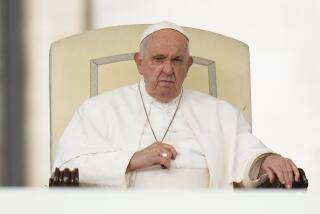Glemp Assails Regime, Defends Polish Priests
- Share via
WARSAW — Poland’s Cardinal Jozef Glemp, in an unprecedented meeting with Western reporters, accused the Communist government Monday of directing a propaganda campaign against the Roman Catholic Church.
Glemp also rejected charges by Premier Wojciech Jaruzelski that dissident priests were violating Polish law in speaking out against government repression.
“I understand the attitude of some priests is not liked at all, but I cannot agree that it is a violation of the law,” Glemp said.
Glemp’s remarks at a 35-minute news conference in an office at his official residence reflected the growing tension between the church and government. The normally cautious and publicity-shy cardinal accused the government of attempting to turn the trial of the secret police murderers of Father Jerzy Popieluszko into a trial of the dissident priest and the church in order to serve its own propaganda goals. The four defendants were sentenced recently to prison terms ranging from 14 to 25 years.
Glemp also denied the assertion made by one of the defendants in the trial that the outspoken Popieluszko had agreed to be transferred to Rome as part of a church-state compromise.
Barometer of Concern
Although the primate’s remarks against the government were less aggressive than language he has used in two recent sermons, his decision to address them to Western reporters was viewed as a barometer of how seriously he viewed the government’s charges. Glemp has never met Warsaw-based Western correspondents in a group and has routinely rejected requests for personal interviews.
Almost 90% of Poland’s 37 million people are practicing Roman Catholics, and the church constitutes a major political force, often at odds with the Communist authorities. At least limited cooperation between the two centers of power is considered essential to the country’s stability.
Both Polish sources and Western political analysts here said Monday they feared a possible further deterioration of church-state relations in the short term, but that mutual interests would appear to make a full-scale crisis unlikely at present.
“Jaruzelski isn’t strong enough to get along without the church and the church needs government help to achieve its programs,” noted a Western political analyst who declined to be quoted by name.
Exactly what caused the government to launch its anti-church propaganda campaign midway through the monthlong Popieluszko murder trial remains unclear.
Soviet Propaganda Team
Some linked it to a Soviet propaganda team that arrived in Warsaw shortly after the trial began in late December. Others believe it was pressure from hard-liners within Jaruzelski’s own party who demanded the anti-church rhetoric as the price for putting secret police officers on open trial.
In the course of the proceedings, the chief public prosecutor, whose primary job was supposedly to press the case against the four police officers, frequently digressed to attack the church. At one point, he attempted to equate Popieluszko’s anti-government rhetoric with his murder, stating that “one extremism leads to another extremism.”
The prosecutor’s remarks were prominently displayed by the government-controlled media’s accounts of the proceedings.
Late Friday, in an interview with three Western reporters, Religious Affairs Minister Adam Lopatka warned that the government would not hesitate to arrest Catholic priests engaged in what he termed “criminal activities.”
“If there is a priest who deserves it, he will surely be arrested,” Lopatka said. “We do not intend to allow a situation in which various extremisms transform themselves into criminal activities.”
‘One or Two’ Arrests
A respected Polish academic who monitors church-state relations appeared to accept Lopatka’s remarks at face value. In an interview Monday, he predicted that the government might arrest “one or two” outspoken priests, but that the authorities were not strong enough to mount any sustained campaign against the church.
In the church’s initial reaction to the government attacks, Archbishop Bronislaw Dabrowski, secretary to the church episcopate, earlier this month addressed letters of complaint about the trial’s coverage to the heads of the government news agency, PAP, and the radio and television networks.
More to Read
Sign up for Essential California
The most important California stories and recommendations in your inbox every morning.
You may occasionally receive promotional content from the Los Angeles Times.













